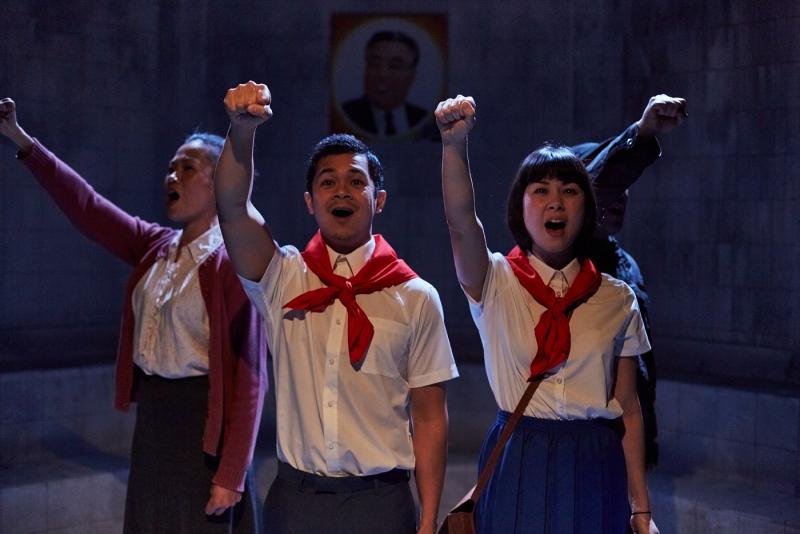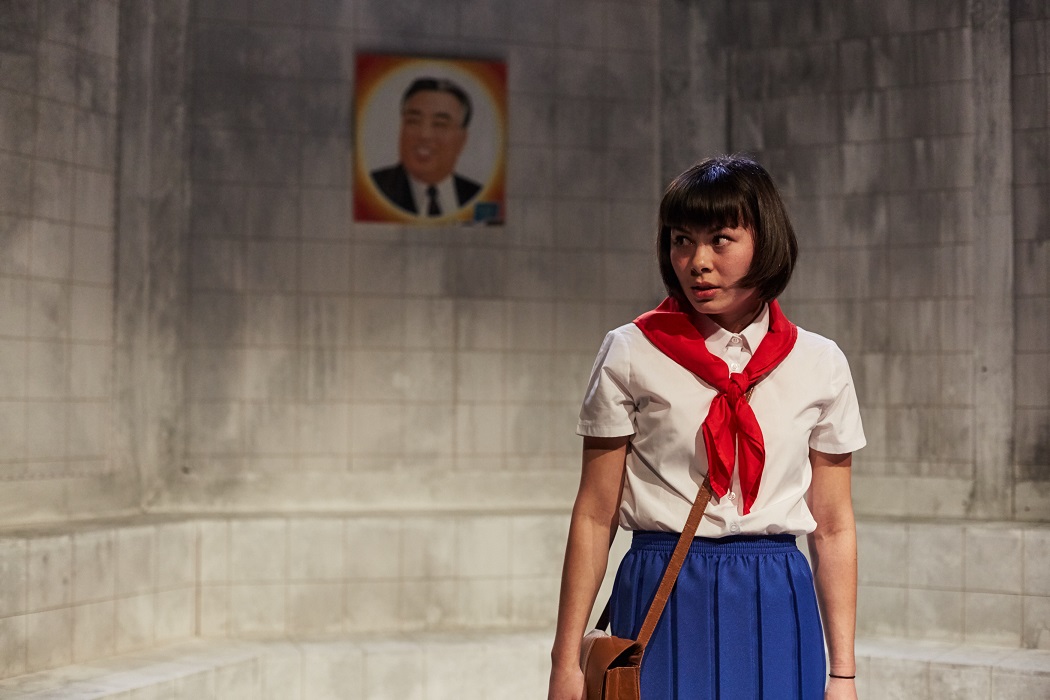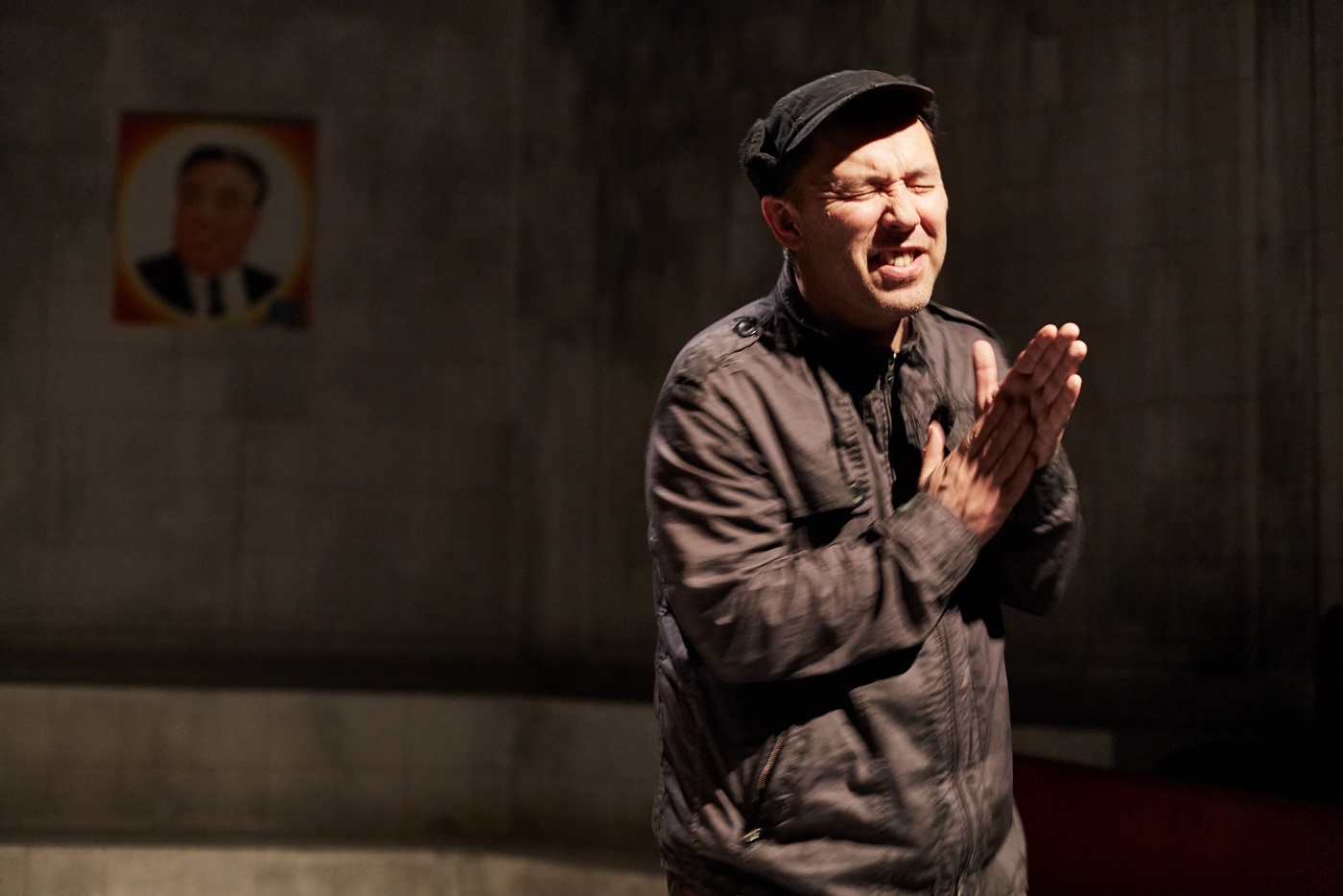P’yongyang, Finborough Theatre | reviews, news & interviews
P’yongyang, Finborough Theatre
P’yongyang, Finborough Theatre
Confident ensemble work propels new play that attempts to go inside North Korea

Every incarnation of totalitarianism has its own specific mythology, which exists in different forms as it is believed at home and “translated” abroad (or not, in both cases). North Korea surely occupies a special place in any such hierarchy, possibly because we’ve entered the late phase of totalitarian statehood (which seems doubtful), or because the incarnations of third generation dynastic Communism have become so peculiar that they stand out even by the standards of the genre.
Either way, it's a risky business when an outsider tries to take us inside such worlds: it can involve a step of suspension of disbelief too far, or risk just recycling the accretions of historical hearsay. Seoul-born, British-raised In-Sook Chappell’s new play P’yongyang can’t help skirting such issues, but achieves a sincerity in performance which convinces in Chelsea Walker's production: its fine, spare cast of four let the text, uncomplicated in itself but redolent, speak with just the right resonance for the compact space of the Finborough.
They’re caught up in the national myth of their homeland
The characterisation of the two main players is established right at the start, only to be subtly rebalanced during the course of the play. We encounter them first aged 15, at the end of the 1980s: Chi Soo (Chris Lew Kum Hoi) is confident, his sense of himself and what he intends to all the more striking for the contrast with the gauche diffidence of Eun Mi (Anna Leong Brophy, pictured below). They’re caught up in the national myth of their homeland, “the country established by the people” as the play’s opening anthem describes it, and eager, as they audition to go and study performing arts in the glamorously distant P’yongyang, to serve it through the myth factory that is its cinema industry. They know its stars and its stories by heart, as well as the special importance that film has to the “Dear Leader”, Kim Jong-il, whose image looks down on proceedings throughout.
But their paths diverge, dictated by the Orwellian division of this young society into three ideological classes – core, wavering and hostile. Chi-Soo is shocked to learn that he belongs to the third category, and his charisma can do nothing to reverse the stigma of being the son of a traitor: his father had fought on the South Korean side during the war, going through re-education camps before being allowed back into society and a gruelling job as a miner. In his willingness to denounce his father as “less than a dog”, Chi-Soo has lost track of how he’s grown up in a happy, loving family, one which has kept hope and humanity despite its circumstances. Maintaining hope against the odds becomes a recurring theme.
 Her shyness overcome, Eun-Mi proceeds along the path of her dreams, making it to the capital and embarking on a career as an actress. But the hint dropped at the beginning of the play, that for women any such induction into the elite involves “attending upon” the leader(s) in their many palaces, gains a bitter truth, as she enters the circle of “The Producer”, as the Kim Jong-il character is referred to here. He's laconically caught by Daniel York as a man whose mind may be smaller than his ample forehead, but who’s capable of self-irony as he wields his nefarious power.
Her shyness overcome, Eun-Mi proceeds along the path of her dreams, making it to the capital and embarking on a career as an actress. But the hint dropped at the beginning of the play, that for women any such induction into the elite involves “attending upon” the leader(s) in their many palaces, gains a bitter truth, as she enters the circle of “The Producer”, as the Kim Jong-il character is referred to here. He's laconically caught by Daniel York as a man whose mind may be smaller than his ample forehead, but who’s capable of self-irony as he wields his nefarious power.
Eun-Mi has entered a world of city luxury – complete with telephone and French cognac that’s pressed on her – but its pleasures are fickle and short-lived. Chi-Soo’s world changes in the other direction, as rural areas endure famine. As they struggle to control their own destiny, life reunites and then separates them again, before a final re-encounter is contrived a decade later, in a new world which has brought new disillusionments.
 I’m not sure that Chappell’s ending – it’s as if the action is suddenly switched off – works as a conclusion to her tale of these two characters following their hard-trod road to liberation (literal) and self-knowledge (relative). But the brio of the ensemble playing more than compensates: Brophy and Hoi maintain an almost crystalline honesty throughout their travails, and there’s brisk and effective doubling from Lourdes Faberes (as Chi Soo’s mother and Eun Mi’s companion in big-city decadence), and particularly York as the boy’s father, pictured left, and the nation’s despot. One surreal moment has Kim lamenting the contrast between the film industry he’s done so much to shape, with its Socialist Realist pathos, and the new approach of Lars Von Trier’s Dogme movement, going “back to the basics, back to simple storytelling and acting”. That may seem an unlikely comparison, and there's artifice of course in the staging, but the freshness of P’yongyang does indeed come through in its simplicity.
I’m not sure that Chappell’s ending – it’s as if the action is suddenly switched off – works as a conclusion to her tale of these two characters following their hard-trod road to liberation (literal) and self-knowledge (relative). But the brio of the ensemble playing more than compensates: Brophy and Hoi maintain an almost crystalline honesty throughout their travails, and there’s brisk and effective doubling from Lourdes Faberes (as Chi Soo’s mother and Eun Mi’s companion in big-city decadence), and particularly York as the boy’s father, pictured left, and the nation’s despot. One surreal moment has Kim lamenting the contrast between the film industry he’s done so much to shape, with its Socialist Realist pathos, and the new approach of Lars Von Trier’s Dogme movement, going “back to the basics, back to simple storytelling and acting”. That may seem an unlikely comparison, and there's artifice of course in the staging, but the freshness of P’yongyang does indeed come through in its simplicity.
The future of Arts Journalism
You can stop theartsdesk.com closing!
We urgently need financing to survive. Our fundraising drive has thus far raised £49,000 but we need to reach £100,000 or we will be forced to close. Please contribute here: https://gofund.me/c3f6033d
And if you can forward this information to anyone who might assist, we’d be grateful.

Subscribe to theartsdesk.com
Thank you for continuing to read our work on theartsdesk.com. For unlimited access to every article in its entirety, including our archive of more than 15,000 pieces, we're asking for £5 per month or £40 per year. We feel it's a very good deal, and hope you do too.
To take a subscription now simply click here.
And if you're looking for that extra gift for a friend or family member, why not treat them to a theartsdesk.com gift subscription?
more Theatre
 Macbeth, RSC, Stratford review - Glaswegian gangs and ghoulies prove gripping
Sam Heughan's Macbeth cannot quite find a home in a mobster pub
Macbeth, RSC, Stratford review - Glaswegian gangs and ghoulies prove gripping
Sam Heughan's Macbeth cannot quite find a home in a mobster pub
 The Line of Beauty, Almeida Theatre review - the 80s revisited in theatrically ravishing form
Alan Hollinghurst novel is cunningly filleted, very finely acted
The Line of Beauty, Almeida Theatre review - the 80s revisited in theatrically ravishing form
Alan Hollinghurst novel is cunningly filleted, very finely acted
 Wendy & Peter Pan, Barbican Theatre review - mixed bag of panto and comic play, turned up to 11
The RSC adaptation is aimed at children, though all will thrill to its spectacle
Wendy & Peter Pan, Barbican Theatre review - mixed bag of panto and comic play, turned up to 11
The RSC adaptation is aimed at children, though all will thrill to its spectacle
 Hedda, Orange Tree Theatre review - a monument reimagined, perhaps even improved
Scandinavian masterpiece transplanted into a London reeling from the ravages of war
Hedda, Orange Tree Theatre review - a monument reimagined, perhaps even improved
Scandinavian masterpiece transplanted into a London reeling from the ravages of war
 The Assembled Parties, Hampstead review - a rarity, a well-made play delivered straight
Witty but poignant tribute to the strength of family ties as all around disintegrates
The Assembled Parties, Hampstead review - a rarity, a well-made play delivered straight
Witty but poignant tribute to the strength of family ties as all around disintegrates
 Mary Page Marlowe, Old Vic review - a starry portrait of a splintered life
Tracy Letts's Off Broadway play makes a shimmeringly powerful London debut
Mary Page Marlowe, Old Vic review - a starry portrait of a splintered life
Tracy Letts's Off Broadway play makes a shimmeringly powerful London debut
 Little Brother, Soho Theatre review - light, bright but emotionally true
This Verity Bargate Award-winning dramedy is entertaining as well as thought provoking
Little Brother, Soho Theatre review - light, bright but emotionally true
This Verity Bargate Award-winning dramedy is entertaining as well as thought provoking
 The Unbelievers, Royal Court Theatre - grimly compelling, powerfully performed
Nick Payne's new play is amongst his best
The Unbelievers, Royal Court Theatre - grimly compelling, powerfully performed
Nick Payne's new play is amongst his best
 The Maids, Donmar Warehouse review - vibrant cast lost in a spectacular-looking fever dream
Kip Williams revises Genet, with little gained in the update except eye-popping visuals
The Maids, Donmar Warehouse review - vibrant cast lost in a spectacular-looking fever dream
Kip Williams revises Genet, with little gained in the update except eye-popping visuals
 Ragdoll, Jermyn Street Theatre review - compelling and emotionally truthful
Katherine Moar returns with a Patty Hearst-inspired follow up to her debut hit 'Farm Hall'
Ragdoll, Jermyn Street Theatre review - compelling and emotionally truthful
Katherine Moar returns with a Patty Hearst-inspired follow up to her debut hit 'Farm Hall'
 Troilus and Cressida, Globe Theatre review - a 'problem play' with added problems
Raucous and carnivalesque, but also ugly and incomprehensible
Troilus and Cressida, Globe Theatre review - a 'problem play' with added problems
Raucous and carnivalesque, but also ugly and incomprehensible
 Clarkston, Trafalgar Theatre review - two lads on a road to nowhere
Netflix star, Joe Locke, is the selling point of a production that needs one
Clarkston, Trafalgar Theatre review - two lads on a road to nowhere
Netflix star, Joe Locke, is the selling point of a production that needs one

Add comment